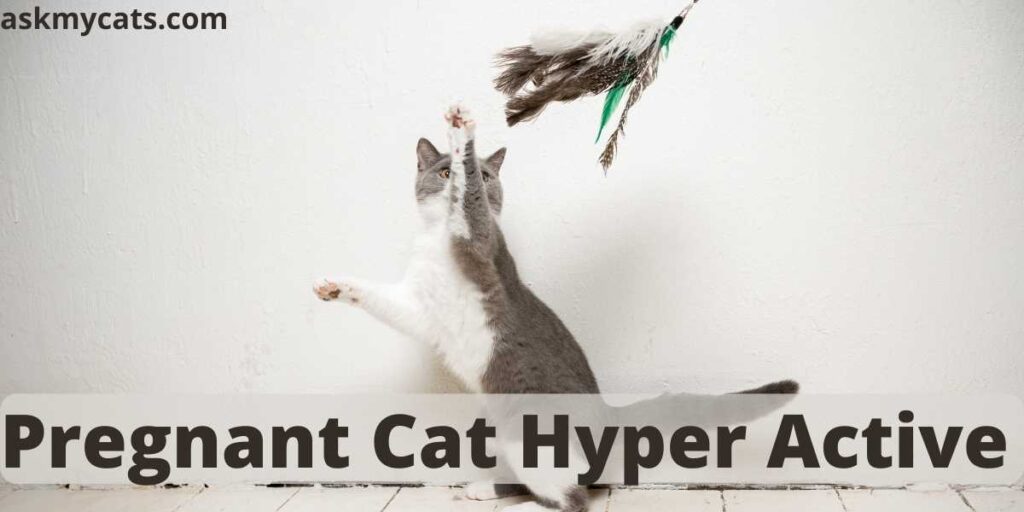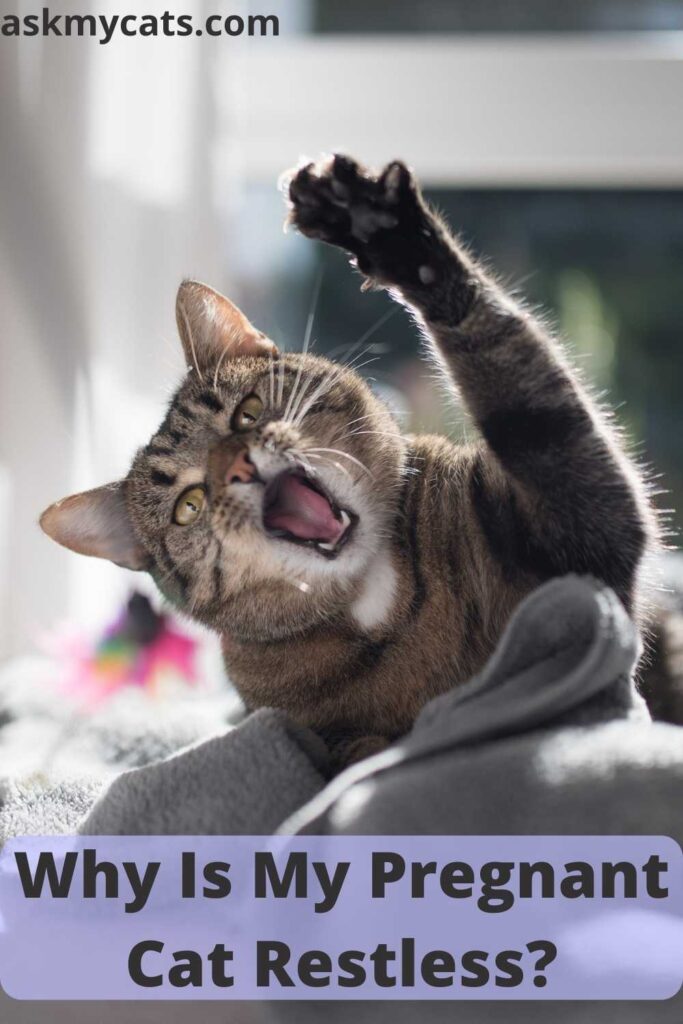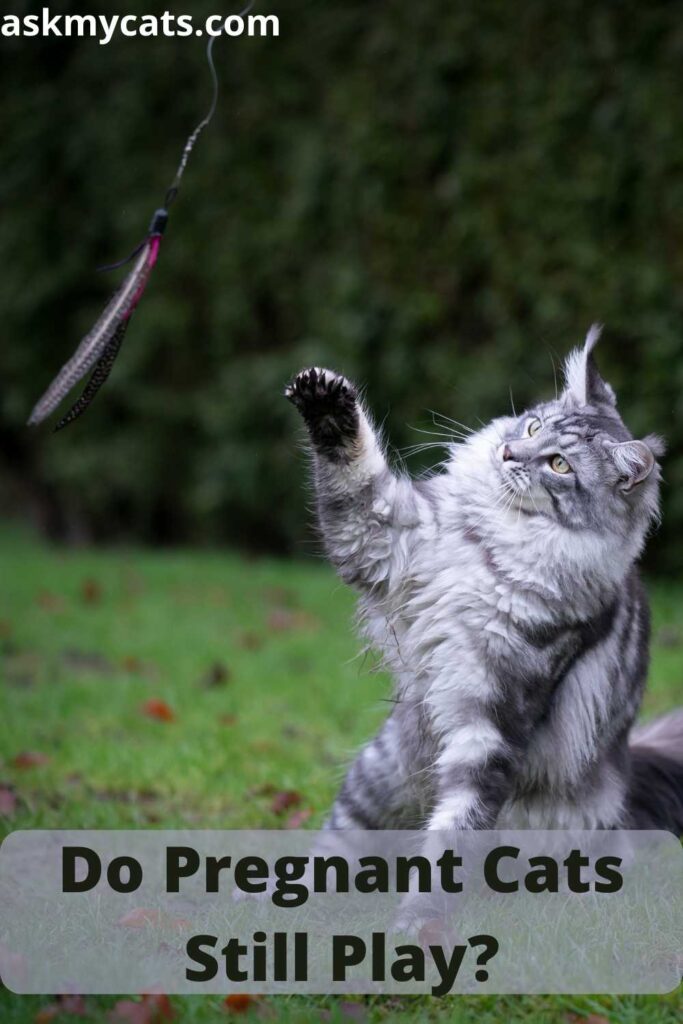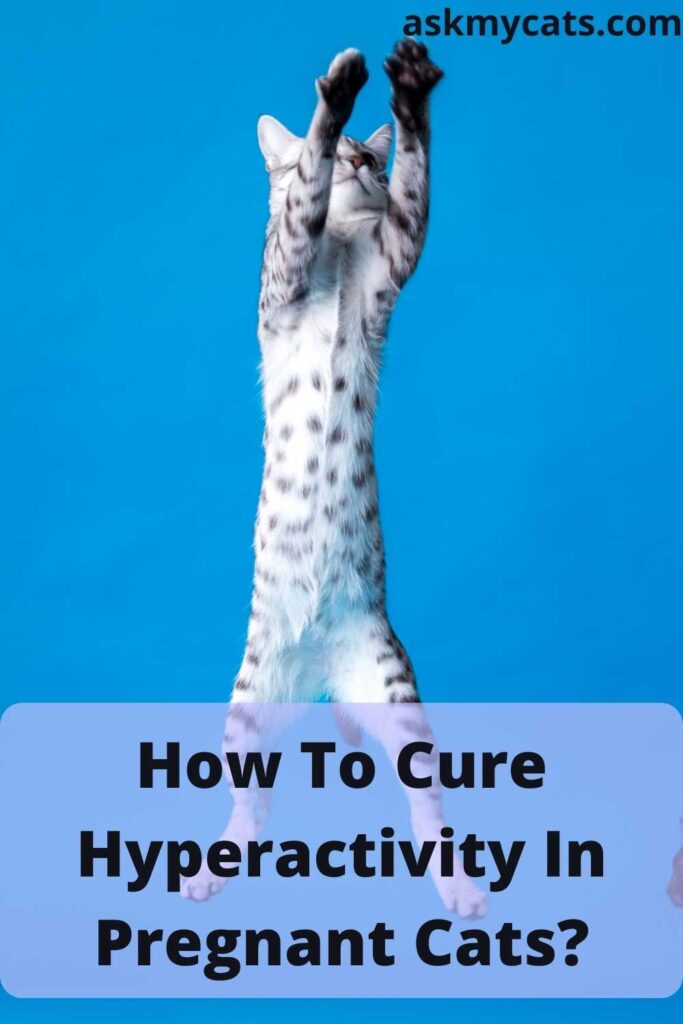Pregnant cats are often relatively calm and spend the majority of their time napping. Some pregnant cats, however, exhibit odd behavior, such as excessive activity, which may be considered abnormal.
So, why does a pregnant cat become hyperactive?
There could be many reasons behind your pregnant cat becoming hyperactive such as age, the animal’s personality, or a health concern that must be detected quickly.
Keep reading this article to know more about the reasons behind your pregnant cat being hyperactive.


Give Your Cat the Perfect Day
Get the Free Ebook!
Why Is My Pregnant Cat Restless And Running Around?
Here are some reasons why your pregnant cat might be restless: –

1. Predatory Instinct
Cats are natural predators, and domestic cats retain some of this instinct.
A hyperactive pregnant cat may be displaying hunting activities, combat movements, or escape techniques at times.
A house cat that doesn’t have to hunt for food nonetheless has to expend pent-up energy, which could manifest as bizarre behavior.
Catnip mice, laser pointers, food puzzles, and feather wands are all toys that enhance a cat’s natural inclinations to grab, chase, and jump.
This activity is especially beneficial for your cat if it does not spend much time outside.
2. Nocturnal Instinct
Another possible explanation for your pregnant cat’s bizarre behavior is that some cats are nocturnal and become more active at night.
If a cat does not get enough activity during the day, it may exhibit unusual behavior.
Many pet cats spend their days indoors alone while their owners are at work. When the cat’s owner returns home in the evening, the cat may be agitated and want to play.
If the cat does not have an outlet for all of its energy, it may display hyperactive behavior.
3. Senility
If you have an elderly pregnant cat, it may be acting strange due to cognitive impairment or senility.
As a pet ages, its brain may begin to work abnormally, causing it to display bizarre behavior for no apparent reason.
Aging cats, like humans, will experience changes in their physical and emotional health.
Feline senile dementia, also known as cognitive dysfunction system (CDS), is a condition that occurs as a cat ages and is directly tied to brain aging.
It could have an impact on their consciousness, learning, memory, and response. It can also be stressful.
Around the age of 11 to 12 years, feline cognitive capacities begin to diminish. Feline senile dementia normally develops once a cat reaches the age of 15 years.
Although the specific causes are unknown, genetic factors may play a part in animals getting the illness, and it may be caused by changes as the cat ages.
4. Fleas
Since it has fleas, a pregnant cat may act erratically and appear to be biting itself at random intervals.
Your cat may be hypersensitive to flea bites or simply have an itch in an area it can’t reach, especially if it’s meowing.
Fleas are not always visible on cats because these tiny, fast parasites can swiftly skitter out of sight into the dense fur of cats.
They feed on the blood of cats by biting their skin, causing acute itching and large lumps. Hair loss and open wounds can result from heavy flea infestations or severe allergic reactions in some cats.
Worse, cat fleas can spread diseases that are harmful to both cats and humans.
Fleas are parasitic crawling and jumping insects.
They feed on mammalian and avian (bird) blood. There are around 2,500 flea species, one of which is the cat flea, Ctenocephalides felis.
If you notice your cat scratching and aren’t sure if fleas are to blame, look for scurrying fleas or tiny black specks in the cat’s fur with your fingertips or a flea comb.
The black specks are usually referred to as “flea dirt,” which is actually flea excrement.
If you suspect your cat has fleas, treat all the pets in the house with a prescription flea treatment formulated exclusively for cats.
You should also contact your veterinarian to evaluate if there are any secondary skin infections or flea allergies that need to be treated.
You’ll also need to treat the environment by vacuuming, doing laundry, and, if your vet recommends it, using area sprays or flea bombs. When the fleas are gone, your cat should cease doing this.
5. Feline Hyperesthesia Syndrome (FHS)
Feline hyperesthesia syndrome (FHS) is a rare cause of a pregnant cat acting strangely, while it mostly affects senior cats and the cause is unknown.
Hyperesthesia is a state of great sensitivity in a cat’s skin, nearly often on the back and frequently in the area just in front of the tail.
This condition is frequently noted when owners go to pet this area and their cat reacts unexpectedly.
The response could be as innocuous as simply scratching the region, or they could get aggressive and try to bite.
Their pupils would dilate, their skin might ripple, and they might drool. There may be a lot of scratching and digging at that or other locations, and some affected cats may chase their own tails.
Some cats may urinate or vocalize. While such a reaction is unpleasant, the true issues are potentially self-mutilating behaviors and, of course, the underlying sensations (i.e. discomfort) that induce this behavior.
Anxiety and stress appear to exacerbate a cat’s hyperesthetic sensitivity, so a treatment strategy may frequently incorporate behavioral features to reduce these.
This may include using drugs to influence behavior and/or developing a routine to reduce the stress associated with change for your cat. Fortunately, most cats can be handled and live happy, active lives.
Consult your veterinarian about the risk of FHS if you notice:
- While your cat is rushing about, the skin on its back looks to be rippling.
- Even after you’ve adequately treated your cat for fleas, it frequently bites at its back above its tail.
- Petting the base of your cat’s tail or back causes it to excessively groom, scratch, or bite the area before running about the house.
Do Pregnant Cats Still Play?
Yes, pregnant cats do play, however, it becomes less than before.

A pregnant cat will choose to stay indoors and seek the attention of its owner over any tomcats.
Pregnant cats are less playful and may need to sleep more than normal.
While your cat may be more subdued, you may have to put up with the occasional mood fluctuation!
Your pregnant queen is likely to want to spend more time inside of the house and will sleep more as the pregnancy will reduce her energy levels.
Inactivity and rest are perfectly normal during feline gestation.
When Does Hyperactivity In Cats Become A Problem?
As previously said, hyperactivity in cats can be a sign of stress or worry. In many circumstances, professional assistance is required to diagnose and treat the problem.
If your cat exhibits unusual daily behavior that you cannot explain, the first step is to seek a physical condition or sickness. You can do this at home, but if you can’t discover the source, don’t put off coming to the vet for a medical exam.
When a normally calm cat suddenly becomes more active, accompanied by additional symptoms such as weight loss, loss of appetite, hair loss, and so on, it could be the result of a major health problem.
How To Cure Hyperactivity In Pregnant Cats?
Here are some steps you can take to cure hyperactivity in Pregnant cats: –

1. Structure in Playtime
Cats, like dogs, require an outlet for their energy.
And if they don’t have legitimate outlets for that energy during the day, you can find them racing around the house, leaping on top of furniture, and getting into places they shouldn’t.
However, experts emphasize the necessity of knowing that cats must vent their energy somewhere.
You may reduce undesirable or excessive behavior in your pregnant cat by scheduling playtime.
It is possible to use cat-friendly toys, such as interactive LED lasers or a tennis ball modified to include rewards.
Experts describe structured playing as “fun, interacting with your cat, and directing their energy.”
If you use a laser pointer for play, provide opportunities for the cat to catch the “prey,” such as pointing the laser at a reward and allowing the cat to pounce on it.
Laser pointer play, without the opportunity to catch the prey, can lead to obsessive behavioral problems such as shadow chasing.
Food-dispensing toys are recommended by certified animal behaviorists, for some cats because they mimic their desire to hunt for food.
Some cats’ scheduled playtimes may last only five to ten minutes. Some of them can become overstimulated and aggressive if they play for an extended period of time.
2. Create Harmony In The Household
Since the domestic house cat’s forefathers were solitary hunters, having a household with several cats or other pets might be stressful for pregnant cats.
Urine marking, as well as improper urination or defecation beyond the litterbox, are strong indications of stress.
According to Experts, the likelihood of urine marking increases 100 percent when the number of cats in the home approaches ten.
When the number of cats in a household grows, cats’ personalities might shift dramatically.
Although a multi-cat household is possible, there is more work to be done to ensure group cohesion.
In this case, the experts suggest talking with an expert animal behaviorist and asking your veterinarian for ideas.
Your veterinarian will consider aspects such as an individual cat’s history, specific problem triggers, and a cat’s early upbringing.
There is no one-size-fits-all approach, but the experts believe that more exercise and mental stimulation are beneficial.
In some circumstances, bringing a cat into a household can help to alleviate conflict.
If your cat exhibits excessive play behavior toward you, owners can consider adding a cat so they can connect with each other.
3. Address Any Hyperthyroid Issues
Not all unpleasant pregnant cat behavior is behavioral. Hyperthyroidism is the most common physical cause of hyperactive behavior in older cats.
Cats with this illness have an overactive thyroid gland, which regulates their energy levels.
As a result, you will have a cat with bursts of energy. Cats with hyperthyroidism don’t sleep much and have a voracious appetite. It usually happens in senior cats.
Methimazole, surgical excision of the thyroid gland, and radioactive iodine therapy are all options for treating hyperthyroidism in cats.
4. Create Safe Outdoor Experiences
If pregnant cats don’t have safe, regulated ways to engage themselves, they’ll find other ways to spend their energy.
Experts compare unusual cat behavior to “cabin fever.”
They’re pent up inside, and while your pregnant cat may seek stimulation outside, hazards such as traffic and wild animals make this an impossible choice.
There are, however, ways to provide your pregnant cat with safe outdoor activities.
Experts suggest utilizing a harness to allow cats to explore with you or installing an outdoor enclosure, such as a catio, to allow your kitty to enjoy being outside without fear of predators.
5. Allow The Behavior
Feline specialists agree that sudden spurts of excitement in cats are often exactly what cats do.
The first question that cat owners may have is whether or not the cat needs to be calmed down.
It’s not necessary to stop the cat if it’s just running and jumping around for five minutes, Experts add. It’s like prohibiting children from running and playing.
Experts encourage cat owners to try redirecting the behavior with a toy to chase or even an empty cardboard box to keep the cat busy if the activity gets dangerous, such as your feline jumping off the top of a fridge.
Owners who indulge in the behavior will eventually observe the pregnant cat settle down. They tend to run around and crash.
Cats do require mental stimulation and exercise. Aside from addressing any behavioral difficulties and harmful home tensions, it’s critical to realize that energy bursts are just a part of who they are.
Interesting Read: Reasons Behind Cat Very Active After Neutering
Frequently Asked Questions
What are cat zoomies?
Cat zoomies occur when a cat becomes agitated for no apparent reason. The animal suddenly assumes an attack stance, the hair on its back and tail stand up, and it begins to move around, running and jumping. The cat calms down after a few minutes of pointless running and retires to its favorite place. What’s the matter with the cat? Don’t worry, it’s typical and happens to the majority of them, with an incident of this type occurring virtually every day until they reach an age where the zoomies occur less frequently or in a milder fashion.
What factors should be considered when choosing a site for a cat’s birth?
Select a quiet spot free of dampness and frigid air. It should be faintly lit instead of brightly lit. If she has a favorite piece of your clothing that she likes to sleep in, you can also include a nightie or T-shirt in the box. Show your pregnant mother her birthing box and encourage her to sleep in it. Consider moving it to a more tranquil spot if she looks to be upset with it.
Final Words
A vet must be visited if you notice your pregnant cat become hyperactive for no apparent reason, in order to get them diagnosed and treated as soon as possible.
If you have any questions, ask us in the comments section.
Must Read: When Do Kittens Calm Down? Are They Always Hyper?
